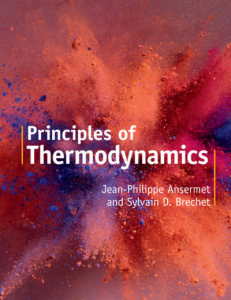| Book Name: | [PDF] Principles of Thermodynamics by Jean and Brechet |
| Category: | |
| Free Download: | Available |

Principles of Thermodynamics is Gtu Reference book for B.tech Mechanical Branch Students in Engineering Second Year by Jean-Philippe Ansermet and Sylvain D. Brechet.
In this introductory textbook, thermodynamics is presented as a natural extension of mechanics, so that the laws and concepts learned in mechanics serve to get acquainted with the theory. The foundations of thermodynamics are presented in the first part. The second part covers a wide range of applications, which are of central importance in the fields of physics, chemistry and engineering, including calorimetry, phase transitions, heat engines and chemical reactions. In the third part, devoted to continuous media, Fourier and Fick’s laws, diffusion equations and many transport effects are derived using a unified approach. Each chapter concludes with a selection of worked examples and several exercises, to reinforce key concepts under discussion. A full solutions manual is available at the end of the book. It contains more than 150 problems based on contemporary issues faced by scientists and engineers that are solved in detail for undergraduate and graduate students.
Principles of Thermodynamics Contents
Part I Foundations
- Thermodynamic System and First Law
- Entropy and Second Law
- Thermodynamics of Subsystems
- Thermodynamic Potentials
Part II Phenomenology
- Calorimetry
- Phase Transitions
- Heat Engines
- Chemistry and Electrochemistry
Part III Continuous Media
- Matter and Electromagnetic Fields
- Thermodynamics of Continuous Media
- Thermodynamics of Irreversible Processes
Part IV Exercises and Solutions
- Thermodynamic System and First Law
- Entropy and Second Law
- Thermodynamics of Subsystems
- Thermodynamic Potentials
- Calorimetry
- Phase Transitions
- Heat Engines
- Chemistry and Electrochemistry
- Matter and Electromagnetic Fields
- Thermodynamics of Continuous Media
- Thermodynamics of Irreversible Processes
Thermodynamics is a theory that establishes the relationship between the physical quantities that characterize the macroscopic properties of a system. In this textbook, thermodynamics is presented as a physical theory which is based upon two fundamental laws pertaining to energy and entropy, which can be applied to many different systems in chemistry and physics, including transport phenomena.
By asserting that energy and entropy are state functions, we eliminate the need to master the physical significance of differentials.
Thus, thermodynamics becomes accessible to anyone with an elementary mathematical background.
As the notion of entropy is introduced early on, it is readily possible to analyse out-of-equilibrium processes taking place in systems composed of simple blocks.
Students engaging with thermodynamics have the opportunity to discover a broad range of phenomena. However, they are faced with a challenge.
Unlike Newtonian mechanics where forces are the cause of acceleration, the mathematical formalism of thermodynamics does not present an explicit link between cause and effect.
Nowadays, it is customary to introduce temperature by referring to molecular agitation and entropy by invoking Boltzmann’s formula. However, in this book, the intrusion of notions of statistical physics is deliberately avoided.
It is important to start off by teaching students the meaning of a physical theory and to show them clearly the very large preliminary conceptual work that establishes the notions and presuppositions of this theory.
Punctual references to notions of statistical physics, which are not formally presented, give the impression that in science the results from another theoretical body of knowledge can be borrowed without precaution.
By doing so, students might not perceive thermodynamics as a genuinely scientific approach. It is clear that the introduction of entropy with a mathematical formula is somewhat reassuring. However, it is by performing calculations of entropy changes in simple thermal processes that students become familiar with this notion and not by contemplating a formula that is not used in the framework of thermodynamics.
This book is broken up into four parts. The first part of the book gathers the formal tools of thermodynamics, such as the thermodynamic potentials and Maxwell relations.
Get Paper Book :[easyazon_link identifier=”1108426093″ locale=”IN” tag=”freepdfbookco-21″]Principles of Thermodynamics by Jean and Brechet[/easyazon_link]
Free PDF Book
Principles of thermodynamics PDF
Author(s): Ansermet, Jean-Philippe; Bréchet, Sylvain D
Publisher: Cambridge University Press
Year: 2019
ISBN: 9781108620932
Related Results : Principles of Thermodynamics,principles of thermodynamics jean-philippe ansermet,principles of thermodynamics jean-philippe ansermet sylvain d. brechet,Principles of Thermodynamics PDF,
See More POST On : Mechanical Books



